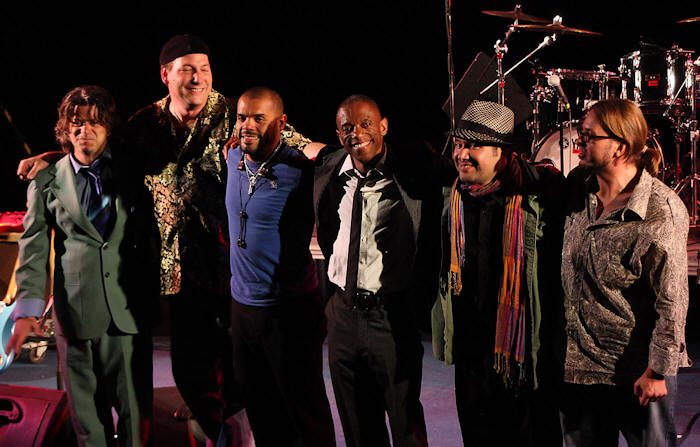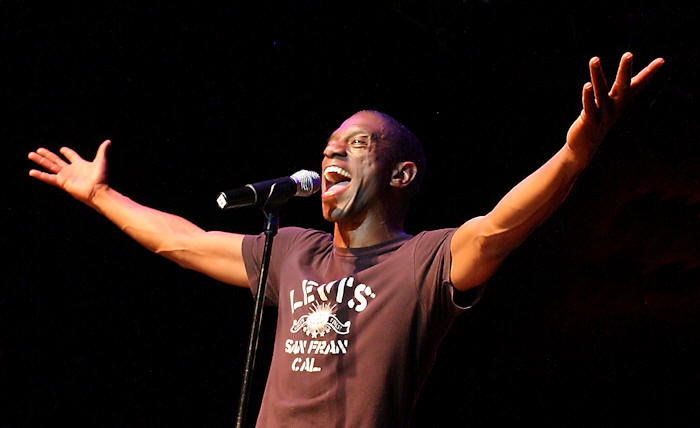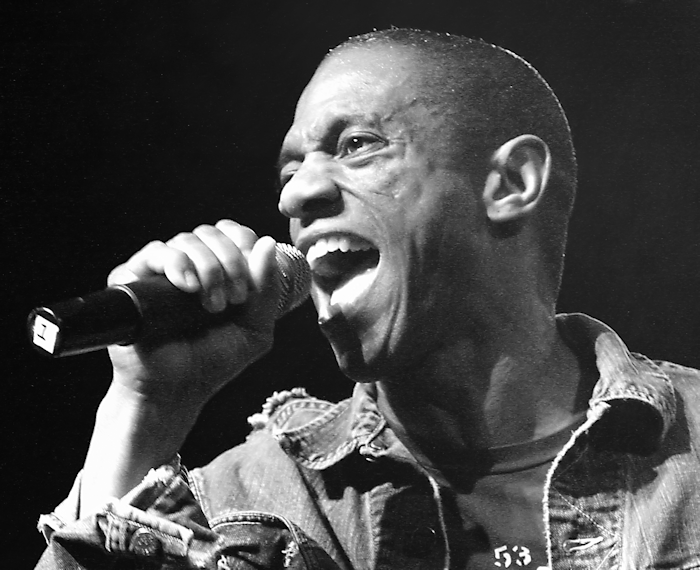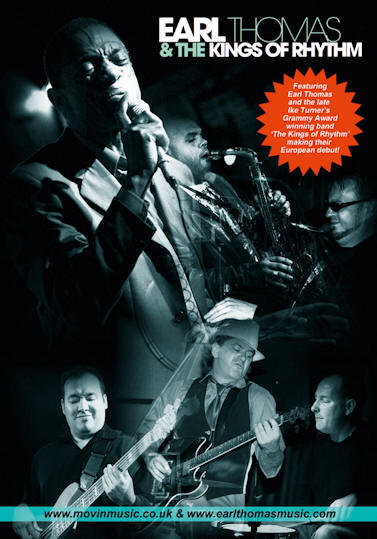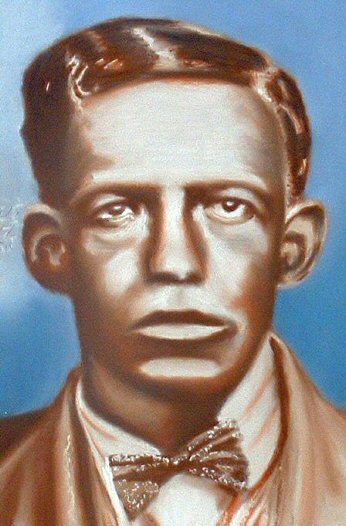
Painting © 2004 Loz
Arkle
Website
© Copyright 2000-2011 Alan White - All
Rights Reserved
Site optimised for Microsoft Internet Explorer



Early Blues Interview |
|
I met up with Earl on his first UK tour with the Kings of Rhythm at the Eden Arts Centre, Penrith. Alan: Earl, I believe that your first introduction to music was when your father took you to see the film 'Soul to Soul' at a small theatre on the island of Guam. What are your memories of music at that time? Earl: Music was always there, I always noticed it but I didn’t think about making it although I knew that I was always drawn to it. I remember I learned in the 4th grade, probably 1969, I learned the song “What goes up, must come down” and I would sing the lyrics and I learnt aged nine that I could learn lyrics really fast. There was always music playing in our house. But when I saw Soul to Soul, I was, wow, I’d like to do that. I don’t know how to do it, but I want to do it. I started pretended like I was doing it.
Earl: I come from a family of singers so we were always singing, especially after dinner on a Sunday evening and sometimes we’d just get a family music thing going. I didn’t actually start to make music for a living or even have an idea of being a real singer until I was a junior at university. Before that it was all imaginary. Then I went to an open mic night with some friends from the dormitories and one of my dorm mates had heard me singing in the shower unbeknownst to me and so I get to this open mic and we’re stood there having some beers and he said, “Hey you guys, Earl can sing! Earl you ought to go up and sing with that guy”. So I said, “No, I don’t really sing, only in the shower”. So they kept saying, “Go on, go do it” and eventually I said that if they bought me one more beer, I’d do it. So they bought me another beer, I went up to the stage and I joined the guy at the open mic and I sang one song and I got a standing ovation. Oh, and when I finished the song, the audience didn’t applaud right away and I thought I’d done a bad job but suddenly they just erupted and everybody stood up. So, I’m like, “Whoa! Shoot me, perhaps I can do this”, so I started going to the open mic night every Tuesday night for about 6 months and I discovered that when I showed up people were asking if I was going to sing and they were really noticing me and I guess I had a little bit of a following. Then I remember one of the people in the audience was a guitar player and he had a band in college and he and his bass player asked me to be their singer. Now I had never been in a band, I didn’t know anything about it, but I said “Sure, why not” and we made a band called Wild Night. Our theme song was Van Morrison’s Wild Night . We just started playing frat parties and dorm parties. We weren’t making any money, it wasn’t about that it was about making music with our friends and then we got a gig opening for John Lee Hooker. It was the first time I ever got paid to sing and it was at a place called the Old Town Bar and Grill in Eureka California and we opened for John Lee Hooker and I just remember that being the turning point. I really started to think, “Wow, we got paid”. It was nothing, about 25 bucks, but we were so proud that we got paid to play music. We kept playing and when I graduated I had a song writing partner, Philip Wootton, and we decided to move to Southern California and be songwriters. I thought that maybe I could get into a band. Again, I didn’t know how to get into a band. The thing that happened with Wild Night was just a fluke. So we went to southern California and within two months I was lead singer with a band called the Rhumboogies, and I’ve never looked back since. That was in 1987.
Earl: Gospel and Country. That was it. Church and country radio. A lot of my relatives do country music although they all do gospel. My Dad, grandfather and uncle were bluesmen. In fact my Uncle Carl played with Buddy Guy back in the days of Buddy Guy, Muddy Waters, Junior Wells and all them. But he died young and never really pursued a career. So my grandfather played fiddle in a country blue grass band for square dancers, so there was always a mixture of blues, gospel and country being played. Alan: Tell me about your musical journey from Tennessee to Montreaux. Earl: I left home at 17 and I went on to college, open mic, the band in San Diego. I was a song writer, Philip and I wanted to write our own songs. The Rhumboogies was basically a blues cover band – we did Wynonie Harris, T-Bone Walker, BB King, all from the 50s, like Cobra records era. But we wanted to write our own songs and the band leader was only into doing that period of cover. And I said, “Okay, I’ll write lyrics, we can play the same style but I’ll write the lyrics.” But he wasn’t into that. So we went our separate ways and when Philip and I graduated we’d petitioned the school to allow us make a record album instead of writing a symphony or a chorale or something to do with classical music we asked if we could make a record album of some style and we decided to do a blues record. It was called I Sing the Blues and we got a book by Diane Sward Rapaport called How to Make and Sell Your Own Record and we made this 33 1/3 album. It was just before CDs came out and we got 1,000 copies. In her book she recommended that you send out to newspapers and radio and just get people to write about it. One of the writers we’d sent a copy to named Buddy Blue happened to have a deal with Bizarre Straight Records and he was also a writer for the San Diego Union Tribune and he gave us a glowing review. He turned that record on to Herb Cohen and Frank Zappa and they thought it would be something worth putting out. And they did. And then Etta James got the song I Sing the Blues and that’s how I went to Montreaux. Everybody wanted to know, who’s this Earl Thomas who wrote this song for Etta James.
Earl: That was surreal! I got a call out of the blue from my friend, Dave Peck, who said, “Hey, we’re doing this move remake and we’d like you to sing over the closing credits.” I said “Sure, I’ll do that. What’s the movie?” “Soul to Soul”. “What, Soul to Soul with Ike and Tina? And Wilson Picket? And the Staple Singers?” He said, “Yeah, do you know that movie?” So I told him the story about being 11 years old and seeing it, and I thought it was a sign from the heavens that I was in the right place. I did the song and then at the movie premiere that was when I first met Ike Turner to really sit down and talk to him. We jammed in his car. Alan: Tell me about Ike. What was he like as a person. Earl: He was the nicest man. Really, truly, the nicest man. So polite, and such a gentleman. Very dignified, very intelligent. A lot of it was because I was enamoured and I wouldn’t have noticed anything else but you know how you get a vibe from people? The vibe I got was not what was portrayed in the movie. That vibe did not exist. The vibe I got from him was of a gentlemen and kind person. Alan: It’s not really the side that is generally portrayed. Earl: It’s not, and part of working with this band is to open up that other side of the dialogue. One of my goals with them is to do the Ike and Tina Turner Song book and with that maybe have an opportunity to give my experience. I don’t know what good it would do but at least I could give a different viewpoint. Alan: Who are your favourite blues, gospel and soul artists? Earl: Ike and Tina Turner, number 1. I like a big eclectic mix of musicians, blues, soul, gospel, Mahalia Jackson, Clara Ward, Otis Reading, Wilson Picket, but then I’m also a fan of Rod Stewart, the Stones, Zeppelin, Cream. I always wanted to be a rock singer, not a soul singer. I wanted to be the black Mick Jagger – that was my secret goal. Rock and roll always spoke to me but now I understand why, because it had so much blues and soul in it. It was blues and soul done with a British accent, and it was tight. And blues, soul, and gospel came partially from Europe; it was European mixed with African. Alan: Who do you think has influenced you the most in your music?
Earl: Ike and Tina, of course! Alan: You’ve written songs for Etta James, Tom Jones, Solomon Burke. How did this come about? Earl: The Etta James song came about because Jerry Wexler heard I Sing the Blues on that album that I mentioned and he was producing Etta’s record The Right Time. He heard ours and got it to Etta. She really liked it, so much so that she called me. I like to tell people that she called me to ask if she could do it, but she didn’t, she called me to tell me that she was doing it. The funny thing was that Herb Cohen said to me, “Have you ever heard of, err Hetta, Ettie, Etta James?” I was like, “Have I ever heard of her?? Of course”. In the African American community she’s an icon, at least as big as Aretha Franklin so to have her recognise my song was amazing. Alan: And then you also did her song, I’d Rather Go Blind”. Earl: Well, I didn’t originally realise it was her song. I thought it was a Rod Stewart song that she’d covered. But when she called she said I should do one of her songs and I said I liked I’d Rather Go Blind and she said, “Well do it”. Alan: And Tom Jones – how did that come about? Earl: I did a gig at the House of Blues in Hollywood and the band was put together by Keb' Mo's music director and he always brought top of the line musicians to every show we did and this time he brought the drummer, Hermann Matthews, and he introduced him as Tom Jones’ drummer. And I wasn’t impressed. I was “Big deal. You’re playing with me tonight”. Then I gave them my list of songs and Get me some was on that list. Unbeknownst to me again, Hermann took this and another song to Tom Jones and he liked it. Then I got an email from a friend of mine who said, “I was in Vegas and my wife made me go and see Tom Jones and I think he’s doing one of your songs”. I didn’t know Tom Jones, and I didn’t think about Hermann at all, so I said “No way” and I was on You Tube one day just surfing and I click on Tom Jones and I’m listening to him doing It’s not unusual to be loved....” and then on the little side bar I see Tom Jones sings the blues and I click on that and he’s doing Get Me Some. That was the moment in my life when time absolutely stood still. I mean, that's the real icon – doing my thing. It was just so amazing.
Alan: Are there any songs you do which have special meaning to you? Earl: Working Together because of Ike Turner. Soul Shine, Daylight, River Deep, Mountain High, Nutbush and Proud Mary all have special meaning. I think I’m probably the only man on the planet who actually sings Tina Turner but I’ve got the perfect orchestra for it. Alan: How did you get together with the Kings of Rhythm band? Earl: Bill Ray lived next door to my best friend when he was about 20 years old. I knew he was a drummer and then I remembered when he got the gig with Ike Turner, everybody was talking about Bill Ray. I remember thinking, “Oh my, I am just so much closer to meeting Ike Turner now. I know Bill, you know 6 degrees of separation and all that. But it never happened. And then one night we had a jam session at this club called Patricks and me and Bill sat in with the band jamming. I told Bill he played just like Soko Richardson, that was Ike’s drummer for a long time. He said, “How do you know Soko Richardson?” so I told him my story about Ike. Fast forward to the movie, and then 3 years after the movie came out. I had a gig in San Diego and I was calling Bill Ray asking if perhaps Ike wasn’t busy then perhaps the band could back me up on a show I was doing for the food bank. As I was dialling Bill’s number on my landline, my mobile phone vibrated with a message from my best friend who used to live next door to Bill. That message said “Ike Turner dead”. It came through just as I finished dialling Bill’s number, so he verified it and then we talked a bit about that, and then we talked about the gig and we got together for rehearsal and then we did the gig. We clicked, absolutely clicked. Part of it was because they worked with Ike Turner for 10 years, I studied Ike Turner all my life so I’m the perfect vocalist for this ensemble. I used to see Ike with different singers other than Tina and this one in particular, Audrey somebody, and I used to think, “Man, she shouldn’t be up there. It should be me! I can put on a blonde wig!” I have a regular gig in San Francisco at Biscuits and Blues and I had this idea of making this live CD as an homage to their 1960 recordings. So after 8 months of rehearsal at Biscuits and Blues I invited the live recording crew and we made the recording.
Earl: If they let it evolve the blues will be around for ever. As long as people are alive there will be blues music because I believe it is the deepest expression of human kind. But unfortunately so many parties, in my opinion, try to play the blues that was made in the 50s, and they haven’t let it evolve. You know, blues and classical music are the only two styles of classical music that don’t evolve. Rock and roll has evolved, so has hip-hop and rap, but the blues is just kept in the same mould. They’re running out of ideas, they are out of ideas – how many times can you sing boy meets girl? Come on! So, I think if the blues can evolve intelligently, then it’ll be okay. But that’s just my opinion! Alan: Future plans? Tours? Earl: We’re going to be touring Italy and Norway in July. And after that I really work on the Ike and Tina Turner songbook and this is the perfect outfit to do it. And nobody’s done it. Bette Midler did the Rosemary Clooney Songbook so why not Earl Thomas and the Kings of Rhythm do the Ike and Tina Songbook? I’ve said this a few times, vain as it may sound, but we are really the only people on the planet that can do this. Everybody else is either too old or they didn’t study it. Alan: Thank you very much for your time Earl.
Return to Blues Interviews List
Website, Photos © Copyright 2000-2010 Alan
White. All Rights Reserved. |





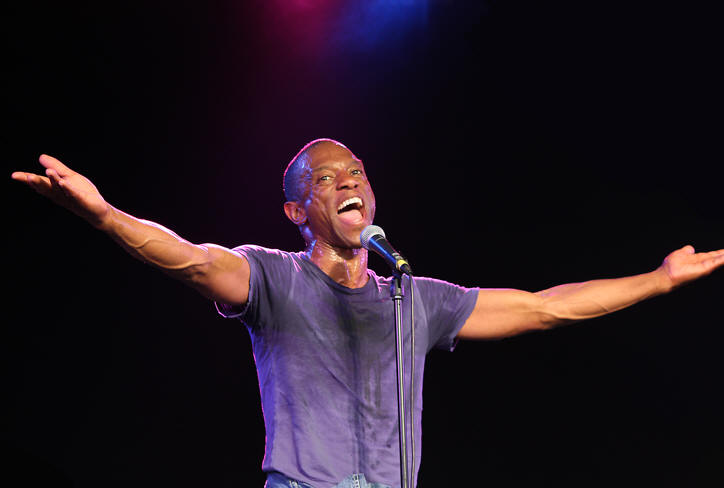
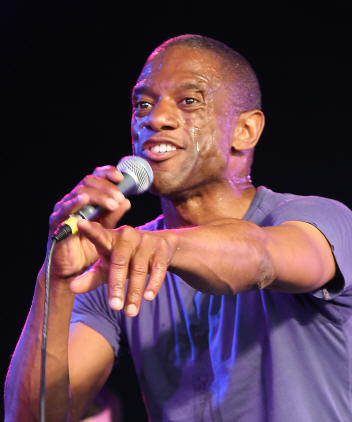
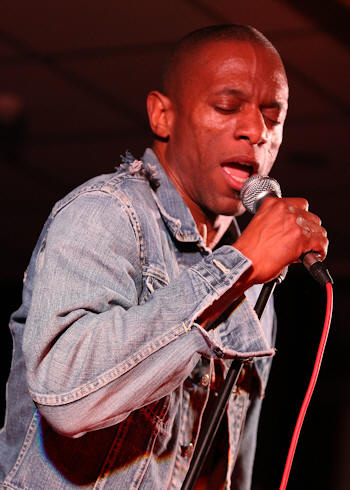 Alan:
What was the music scene growing up in the small town of Pikesville,
Tennessee?
Alan:
What was the music scene growing up in the small town of Pikesville,
Tennessee?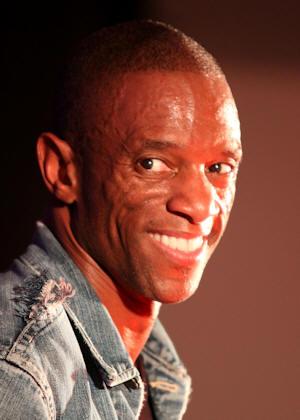 Alan:
The remake of the movie Soul to Soul gave you a chance to sing the
theme song and meet Ike Turner. Tell me about that.
Alan:
The remake of the movie Soul to Soul gave you a chance to sing the
theme song and meet Ike Turner. Tell me about that.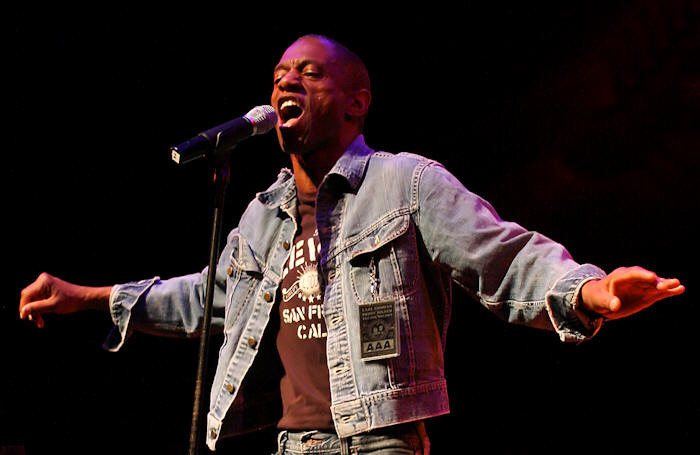
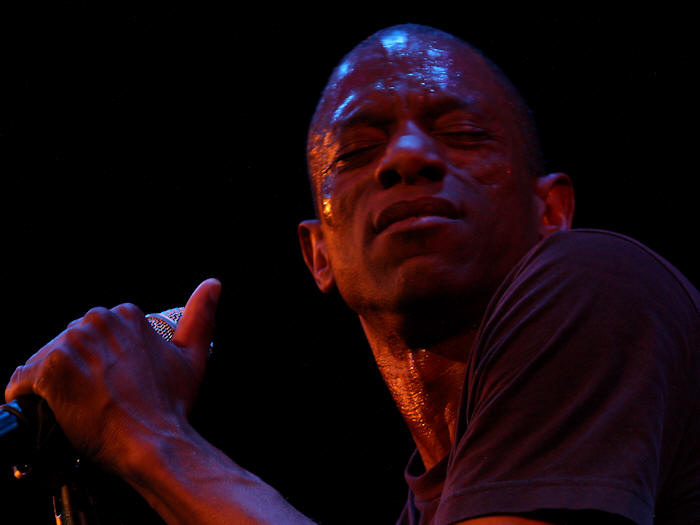
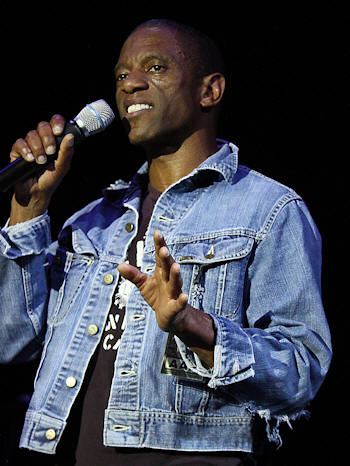 Alan:
How do you see the future of blues music?
Alan:
How do you see the future of blues music?